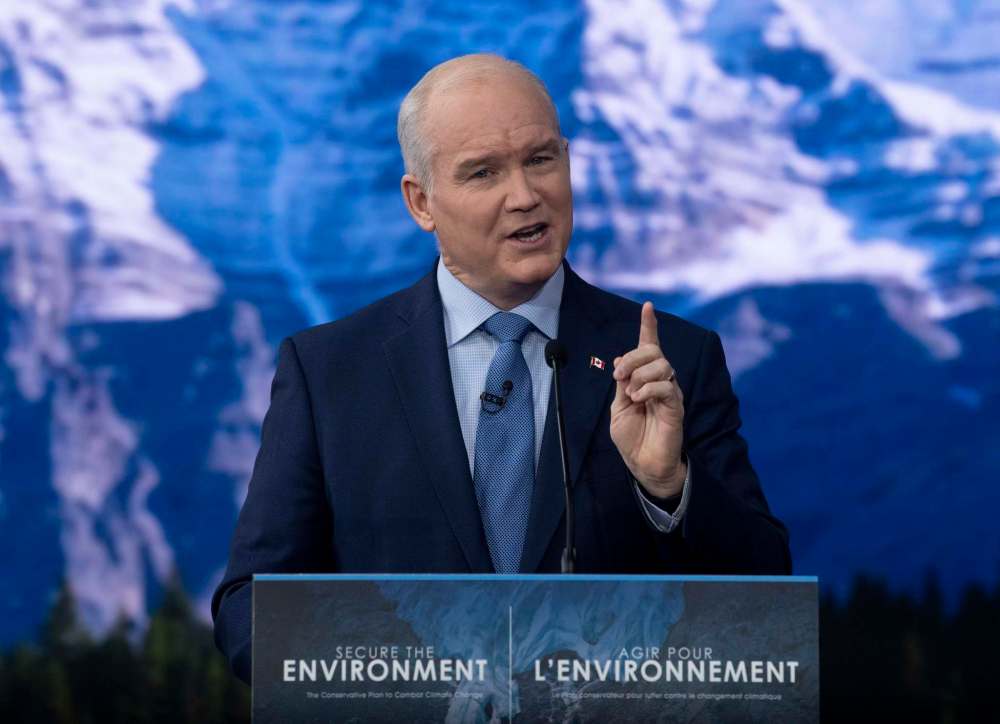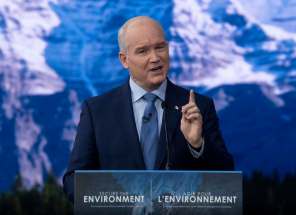Conservatives’ carbon plan taxing
Read this article for free:
or
Already have an account? Log in here »
To continue reading, please subscribe:
Monthly Digital Subscription
$0 for the first 4 weeks*
- Enjoy unlimited reading on winnipegfreepress.com
- Read the E-Edition, our digital replica newspaper
- Access News Break, our award-winning app
- Play interactive puzzles
*No charge for 4 weeks then price increases to the regular rate of $19.00 plus GST every four weeks. Offer available to new and qualified returning subscribers only. Cancel any time.
Monthly Digital Subscription
$4.75/week*
- Enjoy unlimited reading on winnipegfreepress.com
- Read the E-Edition, our digital replica newspaper
- Access News Break, our award-winning app
- Play interactive puzzles
*Billed as $19 plus GST every four weeks. Cancel any time.
To continue reading, please subscribe:
Add Free Press access to your Brandon Sun subscription for only an additional
$1 for the first 4 weeks*
*Your next subscription payment will increase by $1.00 and you will be charged $16.99 plus GST for four weeks. After four weeks, your payment will increase to $23.99 plus GST every four weeks.
Read unlimited articles for free today:
or
Already have an account? Log in here »
Hey there, time traveller!
This article was published 19/04/2021 (1701 days ago), so information in it may no longer be current.
Canada’s Conservative party has officially accepted the logic of a carbon tax as a means of reducing this country’s greenhouse gas emissions.
Many Conservatives have not yet abandoned their detestation of the carbon tax imposed two years ago by the governing Liberals, but officially at least the party has moved on.
Conservative Leader Erin O’Toole presented his carbon tax as though it were not a tax at all but rather a gift to Canadian consumers, like loyalty points at the grocery store checkout.
As with loyalty points, you will be told later — by the government, in this case — how you may spend your points. You will earn points by buying carbon — motor fuel, for example — whose price will be raised to reflect the value of the loyalty points. In plain English, that’s a tax.

Politically, this gives Conservative candidates a way of telling the public that they have joined the Canadian majority in favouring the most obvious way of curtailing the country’s greenhouse gas emissions. It also leaves a fairly clear track for the ruling Liberals to proceed with the rapidly rising carbon tax they have already imposed.
The Conservatives have accepted the principle. Now they’re arguing about the fine print.
Technically, the Conservative plan offers the immense advantage of tying Canada’s policy closely to that of the United States. This country should not impose costs on its exporters that will prevent them from competing in the U.S. and other markets. But it must do all it can to use the price mechanism to steer consumers and producers toward low-carbon choices.
The Biden administration, eager though it is to reduce greenhouse gas emissions, sees no way of getting a carbon tax through the Senate while West Virginia Democrat Joe Manchin remains opposed. President Biden is counting on clean-energy standards and other such regulatory measures to accomplish the same effect.
The Conservative plan would allow Canada to keep in step with U.S. regulations and spare Canadian industry from competitive damage. The Liberals’ carbon tax is not sensitive to the competitive environment. In response to the Conservative plan, Prime Minister Trudeau and his ministers should refine their carbon tax to forestall unintended harm to Canadian industry.
These aspects of the Conservative plan are scarcely visible in the graphically spectacular pamphlet in which the party announced its plan last Thursday. The pamphlet consists mostly of colour photographs illustrating nothing in particular and windy rhetoric to the effect that Canada must not ignore the reality of climate change.
Mr. O’Toole will need a fresh start and a more careful presentation to show the public the one way in which his carbon tax actually may be better than Mr. Trudeau’s.
Mr. O’Toole is running the risk of alienating his party’s most ardent supporters in Saskatchewan and Alberta. Those two provinces elected 47 of the 120 Conservatives in Parliament. He is gambling that he can gain more seats in British Columbia and in eastern and central Canada than he will lose in the Prairies.
That is a reasonable calculation for the long term. In the short term, Mr. O’Toole faces the challenge of persuading the leopard to change its spots, persuading his MPs to start telling the country that the carbon tax they used to condemn is now good policy as long as you call it by another name.








.jpg?h=215)







